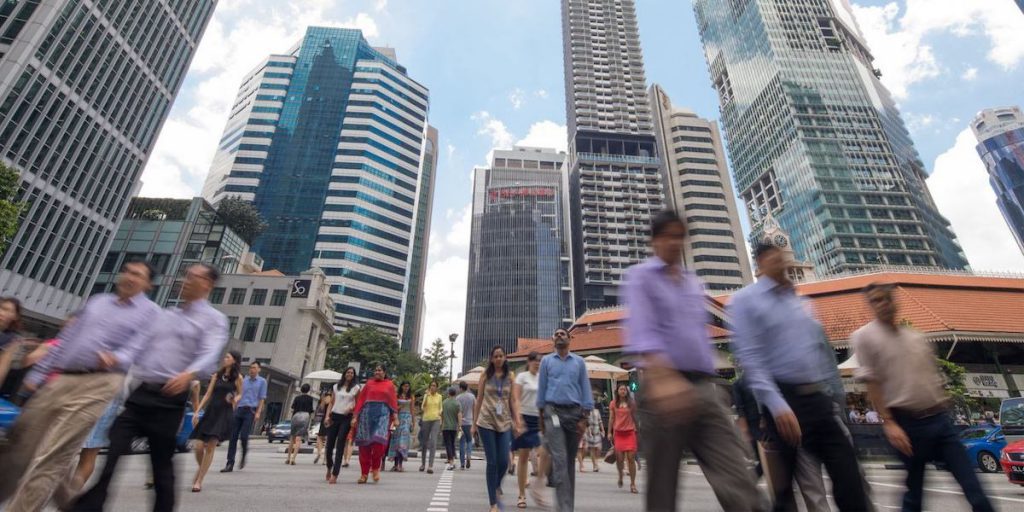The Covid-19 virus outbreak has dampened the job market, as the economy and hiring activities see a slowdown.
Despite this grim outlook, there remains a demand for candidates with niche skill sets, knowledge and experience in fields such as cloud computing, big data, cybersecurity and software engineering, as well as across the healthcare industry and e-commerce sector.
This is according to RGF International Recruitment’s latest Salary Watch report, which aims to better understand salary trends across all industries and job levels in Singapore.
The report is based on a targeted research of more than 200,000 candidates, obtained between February 2019 and February 2020.
How Much Do “Hot Jobs” Pay In S’pore?
Here is a full breakdown of all the salaries of key job roles across various industries in Singapore, along with minimum and maximum salary for each:
(Note: “hot jobs” are listed in blue)
1. Industrial – Smart Manufacturing



2. Technology, Internet And Telecommunications




3. Financial Services (Front Office)


4. Financial Services (Middle Office)

5. Financial Services (Back Office)

6. Healthcare & Life Science

7. Consumer & Retail




8. Corporate Services


9. Media, Advertising & Entertainment



Increased Demand For Technical Roles
Based on the salary data, the report reveals that the demand for increasingly technical roles is on the rise, bolstered by rapid digital transformation.
Smart manufacturing application engineers are able to command up to S$60,000 annually at a multinational corporation (MNC), while business intelligence directors and cybersecurity directors can earn up to S$350,000 and S$420,000 annually respectively.
This also applies to the e-commerce industry, where the adoption of digital tools such as chatbots and automation technologies are driving up the demand for high-skilled roles.
These include digitalisation managers and marketing & branding supervisors at MNCs, who are able to bring in annual salaries of up to S$252,000 and S$168,000 respectively.
Due to rising concerns around public health and safety, the demand for healthcare talent is still prominent in Singapore, as the expansion of medical facilities leads to the need for additional medical personnel.
Medical directors command a salary of up to S$250,000 a year, while R&D managers can earn up to S$140,000 annually in Singapore.

Although the research for the report was conducted ahead of the Covid-19 impact, salaries for highly specialised and in-demand roles will continue to remain high due to the lingering effects of the talent shortage, said James Miles, Managing Director of RGF Executive Search Singapore.
The closure of non-essential services has caused a dip in Singapore’s economic forecast, which in turn has also translated into a slowdown in the hiring landscape — at least for the time being. However, Singapore’s resilient economy and strong support measures announced by the government will help businesses bounce back after this difficult time has passed.
In the meantime, industries such as healthcare and technology continue to experience ramped up hiring, as the demand for these services increases in order to help businesses and the community cope with the impact of the pandemic.
– James Miles, Managing Director of RGF Executive Search Singapore
What Do S’pore Workers And Employers Look Out For?
Money matters — it’s the number one consideration for job seekers when changing jobs.
Another major factor in their decision-making is additional compensation, such as bonuses. However, salary and compensation is not the only factor Singaporean talents consider.
They also look for roles where they can expand their knowledge and skills, take into account the title and responsibilities, and think about career advancement opportunities, leadership style, the company’s reputation, and the level of work-life balance they will be able to achieve.
In contrast, employers look for three key factors in a job candidate: relevant knowledge and experience, culture fit, and adaptability.
Although the government has taken steps to upskill workforces and invest in talent development through the SkillsFuture initiative, employers still face a lack of experienced candidates when recruiting for new roles.
As the job market becomes more competitive, there are measures businesses can take to ensure talent want to work for them, as well as retain current talent.
In addition to ensuring compensation packages are in line with market rates, companies need to reconsider their talent strategy and ensure that it fits current talent trends, such as flexible working arrangements.
Another way to narrow the talent gap is through retaining current staff members.
By pivoting talent strategies to focus on employee value proposition and offering employees incentives such as bonuses referral, additional annual leave if they reach performance goals, and fun team outings to celebrate department achievements, companies will likely boost staff retention rates and, in turn, see an increase in employer brand.
Featured Image Credit: Ministry of Manpower











